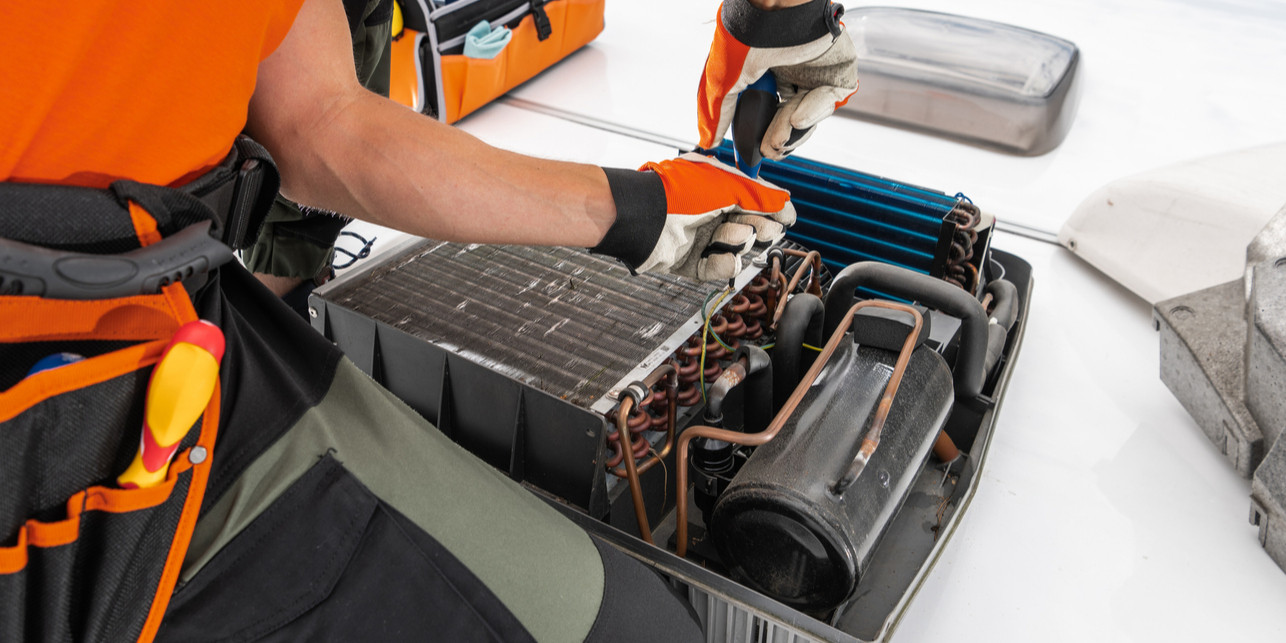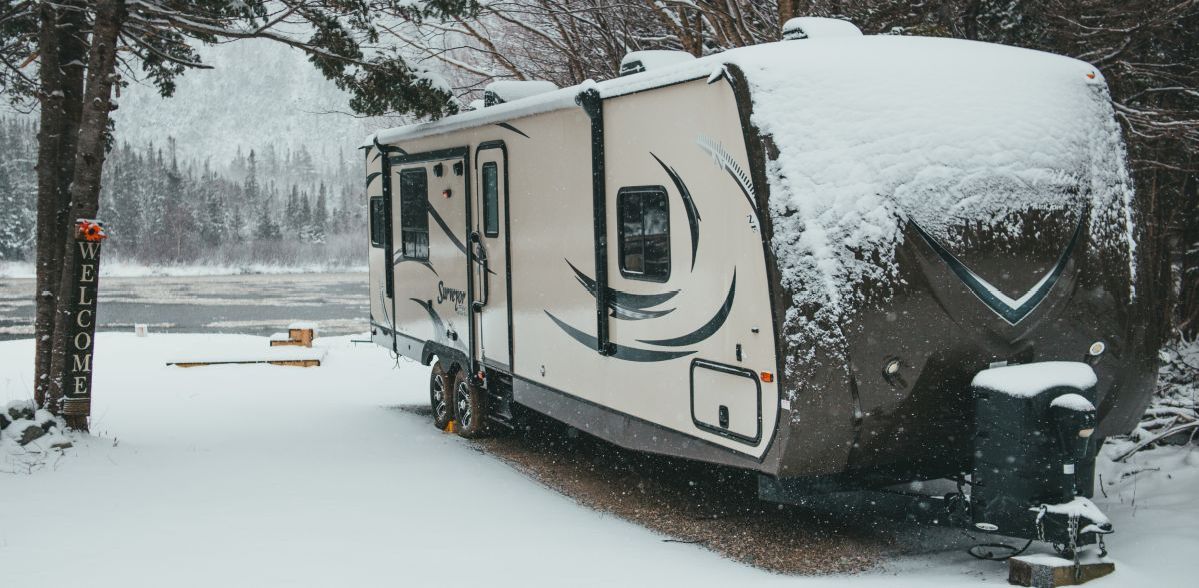If you’ve ever hit the road in summer and had your RV’s air conditioner stop working, you already know how critical HVAC maintenance can be.
Or maybe your heater gave out on a chilly mountain morning - definitely not the kind of surprise you want when you’re trying to enjoy your adventure.
Maintaining your RV’s HVAC system isn’t just about comfort - it’s about keeping things safe, efficient, and hassle-free. The good news? You don’t need to be a mechanic to take care of it.
With a little know-how and a few basic tools, you can keep your system running like a champ.
In this guide, we’ll walk through everything you need to know to take better care of your RV HVAC system - so it works when you need it most.

HVAC MAINTENANCE
How to Clean Your RV Air Conditioner (And Why You Shouldn't Skip It!)
If you've ever wondered why your RV's air conditioner doesn't seem to cool like it used to, you're not alone. Maybe it's blowing less air. Maybe it smells a little funky. Or maybe it's just louder than usual.
These are all signs it's time for a little TLC.
Yes, cleaning your RV air conditioner might not sound glamorous, but trust me—it's absolutely worth your time. It's easier than you think, and the difference it makes is huge.
Not only will it help your AC run more efficiently, but it could even extend the life of the unit.
So grab a screwdriver, a soft brush, and maybe a cold drink - because by the time you're done reading this guide, you'll feel like an RV maintenance pro.
HVAC MAINTENANCE
RV Furnace Maintenance & Common Problems: What You Need to Know
Nothing spoils a cozy night in your RV faster than a furnace that won’t kick on.
You flip the thermostat, expect warm air to blow through, and… nothing.
Or maybe it starts up with a loud whoosh and then shuts off a few seconds later. Sound familiar?
RV furnaces are built to keep you warm, even when you're camping in snow-covered woods or cruising through chilly desert nights. But like anything else in your rig, they need a little regular attention to keep doing their job. And when they act up? It’s usually a fixable problem—if you know what to look for.
In this RV furnace guide, we’ll walk through the basics of RV furnace maintenance, common problems, and how you can stay ahead of the cold. Don’t worry—this isn’t just for “handy” people. You’ve got this.

HVAC MAINTENANCE
RV Ventilation: Why It Matters and How to Keep It Flowing
Ever woken up in your RV to fogged-up windows, stuffy air, or the lingering smell of last night’s dinner?
That’s your ventilation system asking for a little love.
Proper airflow inside your rig can make the difference between a fresh, comfortable space - and one that feels like a sealed-up shoebox. Good RV ventilation isn’t just about comfort. It plays a big role in moisture control, temperature balance, and even your health.
Whether you’re camping in the summer heat or riding out a rainy weekend, your RV’s ventilation system keeps things breathable.
In this RV ventilation guide, we’ll break down what your RV ventilation system includes, how to maintain it, and common issues to look out for. Whether you're a weekend warrior or a full-time traveler, a few small tweaks can make your space feel open, airy, and totally livable.
HVAC MAINTENANCE
RV Airflow and Ductwork: Boost Comfort, Reduce Hassles
Ever notice how one part of your RV feels like the Arctic, while the other is stuck in a sauna? Or how your AC runs constantly but your bedroom never quite cools down?
That’s your RV’s ductwork and airflow playing tricks on you - and it might be time to get things balanced.
RV airflow is more than just where the cool (or warm) air blows from. It affects energy efficiency, temperature control, and your overall comfort. The good news? With a few tweaks, you can dramatically improve airflow throughout your rig without tearing out walls or spending a fortune.
Let’s make sure every room in your RV feels just right.

HVAC MAINTENANCE
RV Electrical & HVAC: Powering Your Comfort on the Road
You flip on your RV air conditioner... and nothing.
Or maybe your furnace fan starts, but the heat never kicks in. If your HVAC system is acting up, there’s a good chance the problem isn’t with the unit - it’s with your RV electrical system.
Unlike your home setup, RV HVAC relies on a mix of 12V DC, 120V AC, and sometimes propane to function. And when even one part of the system isn’t getting the power it needs?
You’re either sweating bullets or bundling up in layers.
In this guide, we’ll walk you through the electrical side of your RV HVAC system—how it works, how to troubleshoot it, and how to prevent future issues. Whether you’re plugged into shore power or boondocking off-grid, this is the power knowledge you need to stay cool (or warm).
HVAC MAINTENANCE
HVAC System Winterization
Preparing your HVAC system for winter storage protects it from damage during freezing temperatures.
Winterization Steps:
- Turn Off the AC System:
- Shut down the air conditioner to prevent it from cycling unnecessarily during winter.
- Clean the Furnace:
- Perform a full furnace inspection and cleaning before winter to ensure it’s ready for cold weather.
- Cover the AC Unit:
- Use an AC cover to protect the outdoor unit from dirt, snow, and debris during storage.
- Drain the Furnace Line:
- If your furnace has a condensation drain line, drain it to prevent freezing.
HVAC MAINTENANCE
HVAC Troubleshooting Tips
Sometimes, your HVAC system may experience minor issues that you can troubleshoot yourself.
Common Issues and Fixes:
- AC Not Cooling Properly:
- Check if the air filter is clogged or the thermostat settings are correct.
- Inspect the ductwork for leaks.
- Furnace Won’t Turn On:
- Ensure the thermostat is set to "heat" mode and the propane supply is on.
- Check if the furnace circuit breaker is tripped.
- Weak Airflow:
- Check for blocked vents or dirty filters.
- Inspect the fan blades and ducts for obstructions.
- Strange Odors:
- If you smell gas or burning, turn off the system and have it inspected by a professional immediately.
HVAC MAINTENANCE
When to Call a Professional
While many HVAC maintenance tasks can be done yourself, certain situations require professional help.
Call a Professional If:
- You detect refrigerant leaks in the air conditioning system.
- The HVAC system makes loud or unusual noises.
- The furnace blower motor fails to start.
- You experience electrical issues or malfunctioning components.
HVAC MAINTENANCE
Tools and Supplies for HVAC Maintenance
Having the right tools ensures you can perform maintenance effectively.
Recommended Tools and Supplies:
- Screwdrivers and wrenches
- Multimeter for electrical testing
- Air filters (spare)
- Compressed air canister
- Silicone spray lubricant
- Vacuum cleaner with hose attachment
- HVAC cleaner for coils and ducts
HVAC MAINTENANCE
Key Takeaway: Keep Your RV HVAC System Running Smoothly
Regular HVAC maintenance ensures your RV stays comfortable, whether you’re camping in the summer heat or winter cold. By following these maintenance tips, you can prevent breakdowns, extend the lifespan of your equipment, and enjoy a more comfortable RV experience.
RV Expeditioners Pro Tip: Create a maintenance schedule for your HVAC system, including seasonal inspections. Stay ahead of potential issues by regularly checking filters, ducts, and electrical components, ensuring your HVAC system is always ready for the road.

